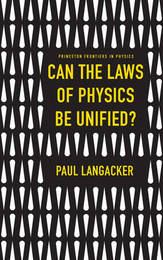
|
Can the Laws of Physics Be Unified?
Hardback
Main Details
| Title |
Can the Laws of Physics Be Unified?
|
| Authors and Contributors |
By (author) Paul Langacker
|
| Series | Princeton Frontiers in Physics |
|---|
| Physical Properties |
| Format:Hardback | | Pages:288 | | Dimensions(mm): Height 203,Width 127 |
|
| Category/Genre | Physics |
|---|
| ISBN/Barcode |
9780691167794
|
| Classifications | Dewey:530.14 |
|---|
| Audience | | Tertiary Education (US: College) | | Professional & Vocational | |
|---|
| Illustrations |
11 halftones. 18 line illus. 5 tables.
|
|
Publishing Details |
| Publisher |
Princeton University Press
|
| Imprint |
Princeton University Press
|
| Publication Date |
28 February 2017 |
| Publication Country |
United States
|
Description
A concise introduction to the cutting-edge science of particle physics The standard model of particle physics describes our current understanding of nature's fundamental particles and their interactions, yet gaps remain. For example, it does not include a quantum theory of gravity, nor does it explain the existence of dark matter. Once complete, h
Author Biography
Paul Langacker is senior scientist at Princeton University, visitor at the Institute for Advanced Study in Princeton, and professor emeritus of physics at the University of Pennsylvania. He is the author of The Standard Model and Beyond.
Reviews"This book is a very worthwhile, balanced, and useful summary of our current understanding of the fundamental laws of physics. Langacker covers a large amount of material in a very digestible way."-Savdeep Sethi, University of Chicago "Langacker is a renowned expert in particle physics who has made fundamental contributions to the field and lived through the golden era of the standard model. Not surprisingly, the scientific level of this informative book is impeccable."-Gian Francesco Giudice, author of A Zeptospace Odyssey: A Journey into the Physics of the LHC "Langacker has written a useful and informative book that brings the standard model to a broad audience of scientists and aspiring scientists who are interested in the current status of particle physics."-Tom Lubensky, University of Pennsylvania
|